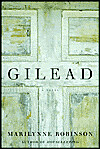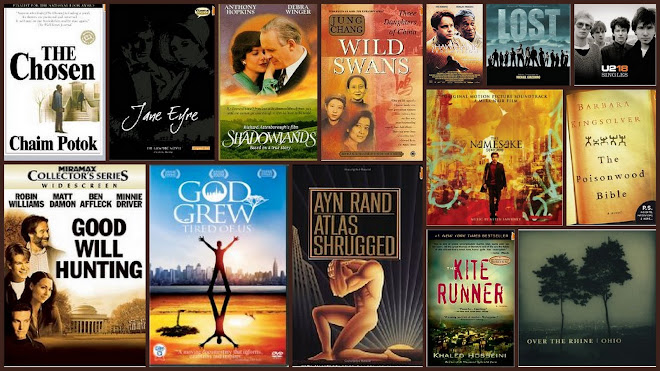
Wow. What a book. Five stars from me.
Gilead fascinates me. I added it to my paperbackswap list because it was a Pulitzer Prize winner and several book bloggers recommended it. The stunning reviews on the back of my copy are from Washington Post, Entertainment Weekly, Chicago Tribune, TIME, etc. I figured it was going to be a good book.
What I didn't expect is for it to be the powerful and blatantly Christian fiction book I have read in a long, long time.
The New York Magazine review said this:
You can appreciate and admire Marilynne Robinson’s beautifully evoked novel if you don’t share her religious values: You can even be moved by it. But unless you are a believing Christian with strong fundamentalist leanings, you cannot truly understand Gilead. Lacking such faith, you’re probably not going to like it much, either. That is, if you read Robinson with the seriousness and intelligence she deserves.
Thing is, I've hardly heard anything about this novel from the Christian world, which doesn't surprise me I guess, because the Christian world is so inundated with shallow feel-good fiction. Robinson IS intelligent, and her book is packed with theology. You just won't appreciate it without being willing to really think about life. Back to the review quoted above:
To pass over it as some light fictional conceit would be to transgress against the novel’s essential meaning. The first two sentiments, for a skeptical, secular reader, are impossible to accept. To such a reader, there is nothing great or bright about suffering and dying; and some human faces, like the faces of torturers, do not possess a trace of courage, and not any sort of loneliness that would arouse love or forgiveness. Ames would test the faith of many Christians, too.Despite all of that, Gilead is highly praised by the literary world. The reason is clear - she writes beautifully. It is the beautiful, reminiscing, meandering thoughts of an old preacher in a tiny prairie town in Kansas. At the beginning I thought it would be the kind of book that I love solely for its achingly beautiful description of small everyday things. Somehow in the midst of that beauty, Robinson ends up unraveling the complex relationships through a couple of generations of families. The central themes are the father-son relationship, forgiveness, blessing, death and life.
I highly recommend the book, but have to be honest and say that if you like easy-reading, you may not like this book. I think you have to be able to read on before you have been drawn into a plot, because this book is delayed gratification in that respect.
A few quotes from the old pastor:
I’m writing this in part to tell you that if you ever wonder what you’ve done in your life, and everyone does wonder sooner or later, you have been God’s grace to me, a miracle, something more than a miracle. You may not remember me very well at all, and it may seem to you to be no great thing to have been the good child of an old man in a shabby little town you will no doubt leave behind. If only I had the words to tell you.
To me it seems rather Christlike to be as unadorned as this place is, as little regarded. I can’t help imagining that you will leave sooner or later, and it’s fine if you have done that, or you mean to do it. This whole town does look like whatever hope becomes after it begins to weary a little, then weary a little more. But hope deferred is still hope. I love this town. I think sometimes of going into the ground here as a last wild gesture of love–I too will smolder away the time until the great and general incandescence. (pg 247)
You can know a thing to death and be for all purposes completely ignorant of it. A man can know his father, or his son, and there might still be nothing between them but loyalty and love and mutual incomprehension. (p 7)
I don’t know exactly what covetise is, but in my experience it is not so much desiring someone else’s virtue or happiness as rejecting it, taking offense at the beauty of it. (p 188)
There are a thousand thousand reasons to live this life, every one of them sufficient. (p 243)
I feel sometimes as if I were a child who opens it eyes on the world once and sees amazing things it will never know any names for and then has to close its eyes again. (p 57)
Sometimes I have loved the peacefulness of an ordinary Sunday. It is like standing in a newly planted garden after a warm rain. You can feel the silent and invisible life.





Oh, yes, Gilead is a beautiful book, isn't it? I don't know why the Christian world hasn't taken it up and talked it up and read it. I think maybe it just takes a great while for even a great book to filter through the culture and into the awareness of any particular group.
ReplyDeleteYep, I felt the same way. What a rarity to see Christianity depicted in an honest and yet positive way in a secular book. I loved it.
ReplyDelete